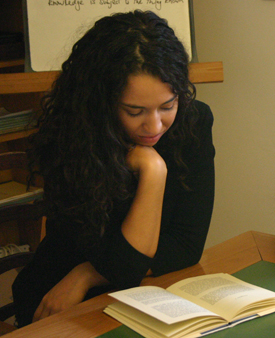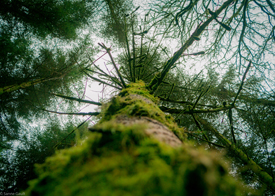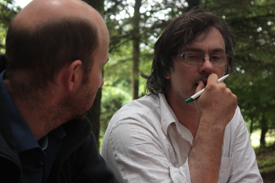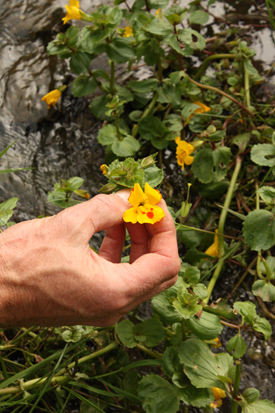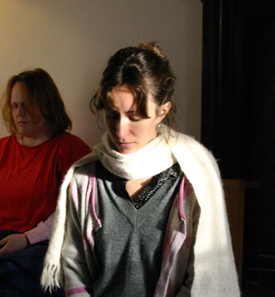Education and the Self
What kind of knowledge is necessary for an uncertain future?
by Peter Young, Principal at the Chisholme Insitute 1984–2015
The first of a series of talks under the title Self Knowledge Global Responsibility, given at SOAS (School of Oriental and African Studies) London, 11 January 2011
In thinking about this talk and the fact that it was happening at SOAS I thought, what is it I would like to hear if I was studying here as a student. And one of the things I would like to know is what kind of thing is it I'm learning? And what kind of learning is it?
Our education today is very much geared in a one-sided way. If I could fine it down to one phrase, I would say it is learning 'about' whatever subject or discipline it is that we've chosen. So, the knowledge that we gain is knowledge 'about' this given subject.
Let's just pause there and ask whether it is, in fact, knowledge? Some of it is, but some of it may not be. Some of it may be knowledge about the current theories, or the history of beliefs, about our particular subject; scientific theories, how they have evolved; what the current state of play is; what people believe is going on and present as a theory.
So our knowledge is just that. It's a knowledge about a particular belief system. Also we have to separate between 'knowledge about’, on the one hand, and ‘belief about’ on the other. It's not easy being a human being and we need to find a place in our interior environment for all these things. And we need to distinguish carefully between the two and also to ask ourselves: "Is there any other kind of knowledge, other than knowledge about?"
The greater part of my life has been devoted to an enquiry into another kind of knowledge which is not knowledge ‘about’, but is more like knowledge ‘from’. This is where we learn a knowledge from the thing itself that we are looking into. So we're not learning ‘about’ it – which is going to be from the outside, nor are we learning what someone has discovered about this subject – but we're going to be learning ‘from’ it.
I'm sure you can see that here there's a stepping-towards this subject, whereby it is not so much 'me' and 'it', but that I enter into very close dialogue with this thing that I'm interested in. And, here, I need to be as receptive as possible to what that thing can inform me about itself. This is getting into the area of, one could say, mysticism, because things aren't supposed to be able to inform you about themselves.
But if we look at it rather as a universal law, that actually, the best knowledge comes from the thing itself, whatever it is; it could be animate, it could be inanimate; it could be some natural law. Well, according to this perspective, that natural law can inform me about itself. I'm sure you're familiar, those of you who looked into traditional societies where the medicine man knows the particular property of a plant, and when asked how he knew what it was good for, his reply is likely to be something like: "The plant told me."
Here, we're entering into a field of something like, universal consciousness, whereby everything is imbued with a knowledge of itself of which it can inform me. How can this be? How is it possible for me, as a human being, to be informed by plants and animals, other people, the universe, about itself?
This is where the greatest enquiry comes into play, which is, to look at oneself. What's going on in oneself? To abandon all views and beliefs about what kind of a person or thing I might be, but to allow my self to inform me about itself. Because, by this same law, the best knowledge comes from the thing itself.
So, my self can inform me about myself, without my trying to find out – trying to find out like under a microscope or in any kind of intrusive way – but with a completely different attitude, I lay myself open to being informed from my deeper self, beyond my idea of what's going on.
Now, if I can do that, this requires a kind of stilling of the normal, everyday thought processes, and entering into a quiet space of enquiry and deep listening. And if I can find my way into that and ask, I can ask any questions at all and answers will come. This is something that requires practice; a lot of intensive practice, and that practice we call education. If this approach is what I want and I want to find out something real, something from the thing itself – that thing being the reality of myself – it can inform me.
The other extraordinary thing that happens, is once I start making inroads into this enquiry, I find that 'myself' is not limited to what I thought to be myself when I started. Because now, I begin to be informed in all kinds of other areas that have nothing to do with myself at all – not in the way that I thought they had. And that's because the Self, the real underlying being, and the underlying being of what previously I thought of as 'other', is actually one and the same. So, I've entered into, perhaps accidentally, stumbled into a very mysterious world of not just inter-connectedness, but unity. I think everyone understands these days that everything is interconnected. Well, the reason is that they are one. So, of course, this one reality is connected to itself. It's like saying any two points on the surface of an egg are connected. Well, it's an egg, so of course they're connected!
We're talking about one reality, which I experience as me, myself, and which is also everything that I'm looking at – all other people and the universe as a whole. But I experience it here. When I enter into the reality of that self, the doors begin to open into all kinds of other levels in which that Self is in expression.
Today, we're at a very critical point, it seems, in our time here as mankind on this planet, where we have all kinds of demonstrations, showings in the ecological sphere, population, world health, bio-diversity, that things are changing. And, I think, everyone here probably realises that these aspects are all pointing back in some way to humanity. So, what we're actually being shown is something about our relationship to the universe as a whole, and that perhaps is where we have to change our view of what's going on.
The model by which we have perceived ourselves is changing. And, perhaps, a door is opening into a different kind of perception of ourselves as being not separate, but deeply interconnected in the sense of one reality in expression as me. That what I thought of as 'other' as humanity, and what it thought of as 'other' cannot be, even logically, absolutely other.
A very interesting situation, which is that one reality is in expression as 'me' and as 'other'; as humanity and the world; as my interior universe of thoughts, beliefs, ideas, sense of meaning, ethics – all of that which I can put under, the label of 'interior' – and, also in expression as everything that's in my exterior; other people, universe, and so on and so forth, which are not absolutely one as there is a difference, obviously, between me and you. But, there's a deep interconnection between these different faces which has been described by some of the great spiritual masters as 'mirroring'. So, the interior is a mirror to the outside and the outside is a mirror to the inside.
Interesting things happen here, which is that I can't do something in the exterior without it having an effect in the interior, and vice-versa. If I have a thought, a private thought in my interior, we see that it has an effect in the exterior because of this mirroring that's going on. If I want to help myself the religions say: "Help others", and we discover that in helping others I help myself. But, if I want to help others, I may be told: "Go and help yourself first... go and find out about yourself first – this is the best way you can help." If you find out about yourself, you can find yourself knowing a lot about others in a compassionate way.
There are very, very interesting things going on here, whereby I do something in one level and it has instant effects in other levels. So here I'm just opening up the connection between self-knowledge and global responsibility. And this has an absolutely sound metaphysical basis. These two fields are absolutely one at an essential level, and they are imaging, mirroring each other in our sense of 'inside' and 'outside', 'self' and 'other', 'mankind' and 'the universe'. We need to understand this and enjoy it.
We've talked about help, and about helping others and finding that it helps ourselves. We could also talk about the problematic things; the violence that goes on and the very severe damage that we do to our interior by violence in the exterior; the fact that the oppressor and the victim, are tied together because it's one reality. This has being exposed very much by the Truth and Reconciliation programme in South Africa, and in Northern Ireland. It's the recognition that there is a single thing going on here, and that the oppressor and the oppressed are tied into the same syndrome and it can only really be solved at the level of unity.
These are some of the details of unity. A tremendous field for exploration, and, one that I trust is being opened up for us now at this time, whether we like it or not. And our models of 'self' and 'other' in ecological spheres, sociological spheres, economic spheres – they're all changing. And our view is being changed. It's one of the critical times in the cycle of humanity, where things are in flux. That's my belief. Let's distinguish belief from knowledge; this is my belief but I feel it in my bones that it is the case.
The title of this talk is: Education and the Self: What kind of knowledge is necessary for an uncertain future?
I hope this title isn't scary. It's not meant to be. Uncertain future? Well, the future is always uncertain. Knowing we can't know the future is a tremendous relief as far as I'm concerned. But, knowing that things are changing can be extremely helpful, and perhaps we can see what happens through learning how to ‘walk’.
Learning how to walk is learning how to move from moment to moment. When we walk, we're in change. It seems like one step is very similar to the next, but it's not. The view is changing constantly. And in learning how to change, we are free to respond to the requirements of the moment without any pre-knowledge of what's going to be required. This knowledge is given by the moment itself. This is the premise that we started with. So, we're informed of what's to be done by the moment itself, in the same way that when someone falls off into the harbour, the rescuer, the hero jumps in because he's informed of what to do, without any thought, without any pre-design. He's moved through being informed.
To sum up. We're under education in different ways. And I'm sure that every one here, even under a conventional education, is perfectly aware that that is only a fraction of the education that's going on; that we're learning constantly from the business of being alive. This is not learning about life. It's learning from life. It's like learning what a thing tastes like through tasting it.
This is an education which we can actively encourage by asking from our being ‘what's going on?’ And, whether or not you believe me, I encourage you to try and to keep on with it, because it is so absolutely extraordinary what is there to be found out, if you're interested. I suspect that most of you are interested, just from the fact that you have come to this talk.
We talked at the beginning about distinguishing between belief and knowledge. We also need to see what emotional attitudes we have to life and what beliefs might colour it, bringing about fear, depression, anxiety, or even a blind optimism. But through tuning into one's being, there is a foundation to be found which is pure good, which is independent of what is going to happen to me.
There is something possible, which is not touched by any of that.
Peter Young, January 2011
